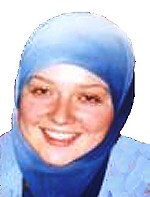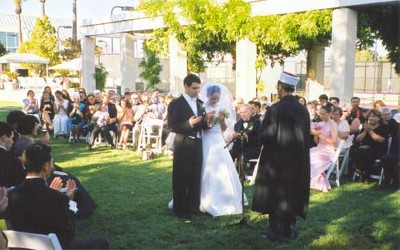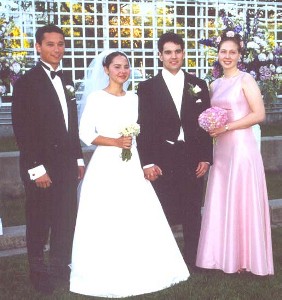|
¹1, 28.02.2001
INTERVIEW WITH A READER IN CALIFORNIA
TG: Sofia, where were you born and raised? S.: I was born in Kazan and lived there until I was 17. I graduated from the Tatar-Turkish lycee there, which is run by the Pedagogical University of Kazan. After graduation, I went to Turkey to continue my education. I studied Mass Communication there for two years at Aegean University in Izmir. Before I finished my studies, however, I left Turkey for California in the United States. TG: What did you study before leaving Kazan? S.: In the lycee, I studied Turkish and English. I attended courses on the Koran at the local mosque in my spare time. My teachers there were also ethnically Turkish. During the final two years of my studies in the lycee, I began to become interested in Islam and Tatar culture. However, the most productive period of my life with regard to these issues began with my departure to Turkey. TG: Why exactly did you leave Turkey for California? S.: Honestly, I could not have anticipated such a turn of events. It was through the grace of a higher power, as they say. When I was finishing the second year of my studies in Izmir, the situation in student circles had changed, so that girls were forbidden to wear Islamic dress (hijab/modest dress) to institutions of higher learning in Turkey. Although I had not yet begun to dress according to the rules of Islam at that time, I had already begun to think about the necessity of hijab (modest dress and an Islamic veil). Because of this, I found it distasteful that many of my friends, who were practicing Muslims, had to either leave their studies or “uncover” in order to continue. And this was done in the name of disseminating Islam in the Turkish Universities. I understood that I, as a Muslim, did not have enough strength for such a mission, and yet I did not want to leave my studies. While I was spending a summer here in the United States studying English, I decided to remain to continue my studies for that reason. Although it may seem to be a paradox, I personally find it much easier to live according to the laws of Islam in America, without anti-religious prejudices. TG: Sofia, where do you study in California, and what is your major? S.: For the time being, I am studying programming at a small college, but this year I am planning, God willing, to transfer to the University of California system, either in Berkley or Los Angeles. There I will continue to study programming or information systems. In college my courses, including programming, are very challenging. I am also continuing to study English. I have one course which more-or-less relates to neurology and is called “The Mind, Intellect and Behavior.” It is very interesting and, more importantly, it is easy. TG: What plans do you have for after graduation? S.: I don't know yet. I've already understood for a long time that I have practically no control over my own life, and that everything happens unexpectedly. But I hope that I will be able to work at least for a time in the profession that I am preparing for. I'd like to be able to stay at a company for some time to gain experience. It is true that I am already a Professor's assistant in the computer lab of my school, and I like the work very much. But all the same it is not really my specialty. TG: How do you like Berkley? .the people there? .your studies? S.: It is very beautiful here. California in general is renowned for having the most picturesque places in the United States. I live in the city of Berkley, which is about a 15-20 minute subway ride from San Francisco. San Francisco is always visible from our side of the bay. Berkley is considered one of the most diverse and liberal cities in California. It has a long and very interesting history. If you have read Jack London, you may know that in many of his works he mentions the cities in this area - Oakland, Berkley and San Francisco. One of the best aspects of the city, however, is that people here are open to different ideas about and approaches to any given issue. For example, the Palestinian Muslim Club from UC - Berkley organized a protest against the occupying regime of Israel in response to the situation there, and many non-Muslims joined in the demonstration. They understood the injustices that are occurring in Palestine. TG: How would you compare the US to other countries? S.: I lived in Turkey for two years, and have been here for three already. I've also been to London, England a few times, and I'd have to say that America, like every country, has its pluses and minuses. It is a country with immense resources and possibilities. It depends only upon itself to make decisions about how to use those resources. We have complete freedom of ideas here, especially in California, and relatively a lot of freedom to act on those ideas. However, on the other hand, it is a very materialistic country. That is, having money and status play a very important role for each individual in the society. This is practically the only way to gain respect. In general, morals are absent from American (Californian) society, especially among my generation. Because of this, the foundational elements of the society, like the family, are in a critical state. The parents of many of my American Christian friends are either divorced or in the process of divorcing. This affects the emotional, and sometimes the physical, state of their children. TG: Do you associate with other Tatars in California? There are quite a few Tatars there, especially from Mordovia - for example, Shamsia apa Apakay. Two days ago we saw one Tatar woman from our Mordovia, who is named Larisa, off at the Saransk station. She lives in Salinas, California with her husband, a Japanese-American. She had already arrived and called home, to Saransk, to speak with her mother, Safia-apa. (Tragically, Larisa passed away just less than a month ago. - Ed.) S.: Yes, I get together with other Tatars here, although recently not very often. They all live outside of San Francisco, and with school and work it is hard to travel. In order to get there, you need a car, and for the time being, I have none. In 1999, my Mother came for a visit, and during that time we got together frequently - we saw other Tatars almost every day for two weeks. As for Shamsia Apakay and her family, I know them very well. She is a very kind older woman, and altogether a very interesting and well-educated person. The last time I got together with other Tatars was when Rushan, Shamsia-apa's grandaughter, got married to Tarik, a Tatar from Finland. It was a very beautiful wedding, and a lot of fun. Rushan and Tarik make a terrific pair.
Burlingame, California. August 6, 2000. Wedding of Rushan and Tarik (a Finnish Tatar). An imam reads the marriage contract. TG: Sofia, what is your family situation - are you married or not? S.: No, I am not married yet. TG: Who pays for your education and expenses? Do you have a stipend? Do you earn the money yourself? S.: My parents pay my tuition, but I earn money for my own expenses. I work two jobs. The first, as I already mentioned, is as a professor's assistant in a computer lab. The second is as a consultant for international students in my college. This includes helping with registration and consulting with international students who study in our college. I also consult with students on visa questions, benefits for students and political asylum questions. I have always liked working with people, especially with people who have come from many different countries.
Center of photo: Rushan and Tarik. Left of couple: Raif Khairulla, a friend of the groom, who is also Finnish Tatar. Right of couple: Susanne Mukhamedzhani, a friend of the bride. TG: Who are your parents, and how do they afford to pay for their daughter's education in the US? Do you have brothers or sisters? S.: My father came to Kazan to study from the village of Sosna in the Baltasi region. He graduated from the Chemical-Technical Institute of Kazan. He did his graduate work and defended his dissertation in Moscow, at Mendeleev Institute. Now he works as the director of a research institute in Kazan. My mother also works in the chemical/technical field. She is an instructor at the post-secondary level in Kazan. Her family also moved to Kazan from the Baltasi region, when she was only seven years old. I have no brothers, but I do have one sister. She studies in the department of computer cybernetics at Kazan University. So, everyone in my family would consider themselves to be intellectuals and scientists, the group that in Soviet times were called engineers. Sofia sent us a letter on February 19, 2001: S.: Very little has changed here. I am very sorry about what happened to Larisa. I never had the opportunity to meet her. By the grace of Allah, God willing, we will all meet in the gardens of heaven. Translated by Michelle HARTNER.
© «THE TATAR GAZETTE» |
 This
interview was conducted on December 14, 2000 with Sofia, a reader of the
electronic version of our paper. She is a college student in Berkley, California.
This
interview was conducted on December 14, 2000 with Sofia, a reader of the
electronic version of our paper. She is a college student in Berkley, California.
